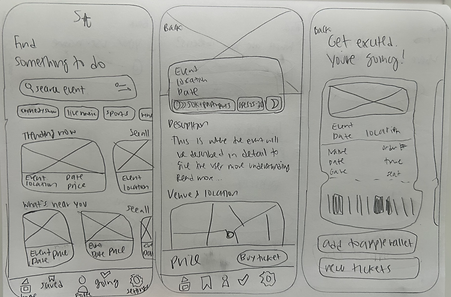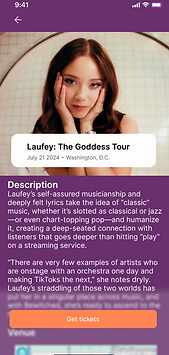Crafting Intuitive Entertainment Search with SocialQuest
I led decisions around what core features should be prioritized to help young, busy professionals find fun in their area.

Role
UX/UI Designer
Duration
4 Weeks (2024)
Team
4 UX/UI Designers
(including me)
Tools
Figma, Trello,
Chat GPT
Research Methods
User Interviews, User Surveys, Affinity Mapping, Persona Creation, User Journey Mapping, Insight Synthesis, Competitive Analysis, Heuristic Evaluation, Storyboarding, Usability Testing, Decision Flow Diagrams, Wireframing, Prototyping, Interaction Design, Visual Design
Project Overview
SocialQuest (SQ) is an entertainment search mobile app. The aim of this project was to solve the problem of overwhelm young, busy professionals face when looking for local, fun, nearby experiences with like-minded communities through an easier nearby entertainment research process with streamlined information.
My Impact
Throughout the project timeline, I led user insight synthesis and overall project management.
Empathy
Drawing insights from user surveys and interviews, I led the development of our user persona that aligned with user needs and pain points.
Brainstorm
I spearheaded the brainstorming sessions for feature ideation and prioritization, translating our collective user insights into a tangible paper prototype that visually brought our innovative ideas to life.
User Test Analysis
Leveraging a user test analysis matrix I developed, I identified key areas for iteration, driving decisions that enhanced the overall user experience.
The Problem
Young, busy professionals who value socializing and exploring hobbies struggle to find the time.
Though they enjoy the planning process, the sheer volume of options and the endless scroll of search results make it overwhelming to pinpoint activities that fit their specific needs.
Empathize
To truly understand what working professionals need for a seamless entertainment search experience, I dove into five user interviews and survey data, uncovering their unique goals and frustrations. This approach helped me paint a clear picture of their challenges and desires.
To enrich our perspective, we conducted a competitor analysis, identifying critical usability gaps and gaining insights from industry leaders. This layered research provided the foundation for designing a more intuitive and empowering experience for our users.
Here are the key challenges they face:
01
Lack of Trust
Users struggled to trust going to events with poor design and no user reviews.
02
Too Expensive
45.5% of users create a budget when planning leisure activities.
03
Not Personal
63.6% of users value personalized event recommendations based on their preferences.
How might we develop SocialQuest so that our customers are successful based on overall user satisfaction?
Ideate
Motivated by our users’ challenges, I led my team in a collaborative brainstorming session to explore potential feature solutions.
We began by discussing elements users appreciated in their current search process and areas they wished were enhanced. Together, we generated big ideas that could serve as inspiration for impactful new features.
After organizing and grouping similar ideas, we voted on those that best addressed user needs while aligning with our timeline. A common theme emerged, addressing core challenges of trust, budget, and personalization.
Create a streamlined, personalized entertainment recommendations search filter that is aesthetically pleasing and simple to use.
We believe that creating an app with personalized event search tailored for young, busy professionals eager to discover new experiences will help users save valuable time and make choosing events quick and effortless.
User Flow
With our user-centered solution clearly defined, we mapped out a user flow that illustrates the complete process of enrollment, event searching, purchasing, and sharing.
This flow serves as a guiding framework for our prototype design, ensuring a seamless and intuitive experience for users.

Prototype
From our user flow, I quickly sketched out a paper prototype. This hands-on approach allowed us to visualize our ideas and streamline our design process before moving on to low-fidelity and high-fidelity prototypes, ultimately saving us valuable time down the road.




Test & Iterate
Given our tight timeline, we focused on simplifying the design in the low-fidelity version to ensure clarity and efficiency for user testing. You can explore the low-fidelity prototype here.
Leveraging insights from my user test analysis matrix, we concentrated our iterations on enhancing the visibility of critical information, including event dates, descriptions, and purchase confirmations.
This ensures that users clearly understand what event they are signing up for and feel confident that their registration is official.


Clear Event Information


Registration Success
Final Design
Developing the SocialQuest mobile app with a focus on entertainment search helps busy, young working professionals spend less time planning and more time having fun with friends. Explore our final prototype here.



Next Steps
To advance further, we recommend a strategy focused on improving user engagment and facilitating informed decision-making during the entertainment research process. This will elevate the user experience and contribute to an overall enhancement of the user journey. The strategy includes the following:
01
Interest-Based Personalization
To enhance user personalization, we recommend incorporating a brief quiz about users' interests during the enrollment process. This will provide tailored recommendations before they reach the search page, streamlining their experience without needing to use current search filters.
02
User Review Feature
As the app grows its user base, foster trust by enabling users to share reviews of the entertainment experiences and venues they visit. This feature will not only enhance community engagement but also provide valuable insights for future users, creating a more informed and trustworthy platform.
Final Takeaways
While working on this project for 4 weeks with 3 teammates with unique working styles, I've learned a lot while going through unexpected challenges with my team.
01
Focus on Outcome
To effectively measure the outcomes of our project, it's crucial to capture user feedback from our high-fidelity prototype through recordings or direct quotes. Without insights from users outside our project, we miss the opportunity to thoroughly evaluate the design's success and identify areas for improvement. Gathering this feedback will provide a more comprehensive understanding of user experience and guide future iterations.
02
It's All in the Details
To strengthen the justification for our design decisions, it's essential to preserve key quotes from the testing phase alongside the summarized notes we've compiled. This will provide richer context and deeper insights, reinforcing our rationale and demonstrating a clear connection between user feedback and our design choices.
03
Functionality First
Prioritizing functionality over aesthetics is crucial. There were several instances where I felt tempted to dive into aesthetic design edits, but due to time constraints, I had to resist. This experience reinforced the importance of ensuring that our solutions work effectively for users before refining their visual appeal.

